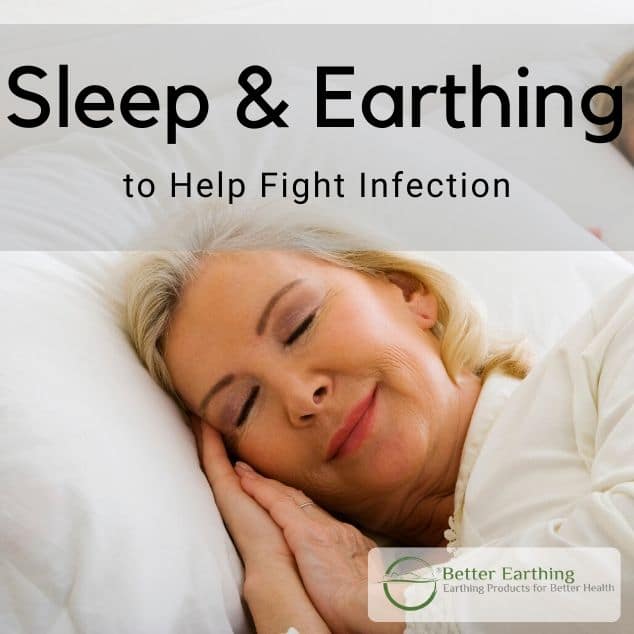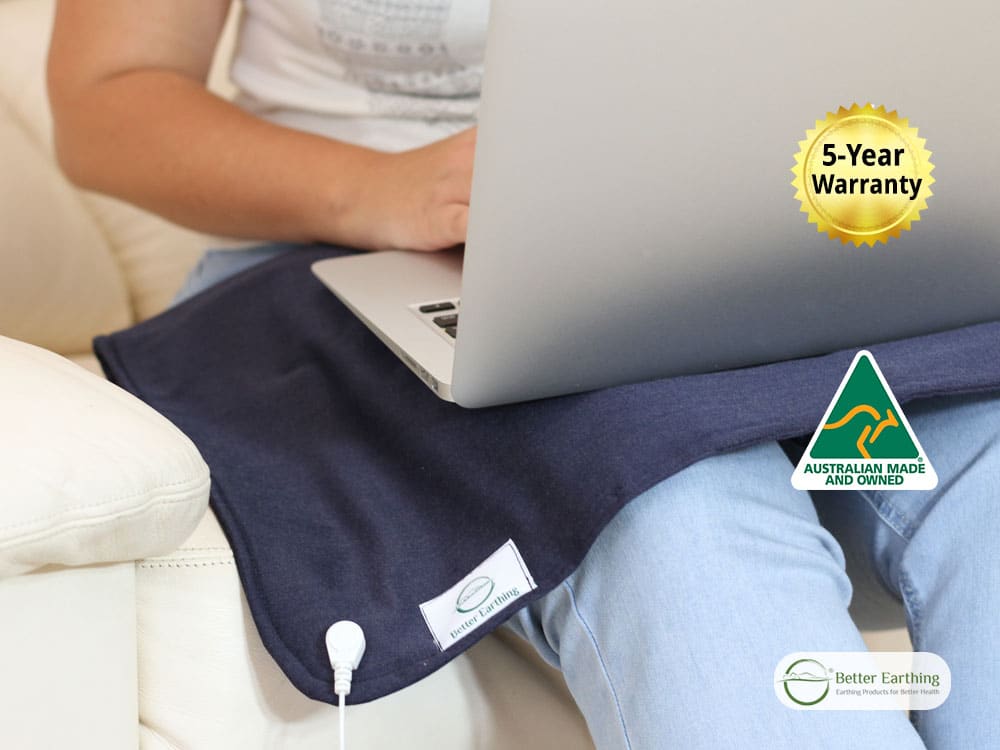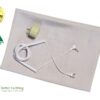How Sleep and Earthing Can Help Fight Infection

Getting enough sleep is essential for maintaining good health. Among other things, it can help to improve mood and memory, enhance blood sugar regulation, and support immune function.
Research has shown that sleep improves the ability of some immune cells to attach to their targets. Meanwhile, poor sleep can leave us more susceptible to illness.
In this article, we discuss how sleep can help us to fight infections, and how earthing can help us get a good night’s sleep.
Sleep and Your Immune System
In 2019, a research team led by Stoyan Dimitrov investigated the effects of sleep on the immune system. They found that sleep improves the ability of immune cells, namely T lymphocytes, to bind to their targets and remove them from the body.
T lymphocytes attach to infected cells using sticky proteins called integrins. They are then able to destroy them to prevent the infection from spreading.
However, certain hormones can interfere with the way these integrins work, thus suppressing immunity. These hormones include adrenaline (also known as epinephrine), noradrenaline (also known as norepinephrine), and prostaglandins E2 and D2.
The body produces adrenaline and noradrenaline during a stress response, which is one reason why stress reduces immunity. However, the researchers found that the body’s levels of these hormones decrease during sleep, allowing T cells to work more effectively.
They tested 10 healthy subjects, allowing half of them to sleep between 11 pm and 7 am, while the other half stayed awake all night. The results showed that the participants who stayed awake had reduced integrin activation, confirming the importance of sleep for fighting infections.
The authors of the study concluded: “These findings provide a potential mechanism for some immune-enhancing effects of sleep on a new, so far unrecognized, level…”
How Your Immune System Works
The immune system is our first line of defence against harmful invaders like bacteria and viruses. When discussing immunity, these organisms are often known as antigens.
When an antigen enters the body, it triggers the release of chemical messengers called cytokines. These summon white blood cells to the area to destroy the infected cells and neutralise the threat.
There are many different types of white blood cells and they all work in slightly different ways. For example, T lymphocytes are produced by the thymus gland and play a vital role in eliminating antigens.
B lymphocytes are produced in the bone marrow and their function is to create antibodies. Antibodies act as a kind of immunological memory. Therefore, if the same antigen attacks the body again, the immune system can respond more quickly.
While the body is fighting an infection, blood flow to the affected area increases. This allows for more effective transport of white blood cells. It also causes the area to become red, swollen, and hot, a phenomenon we know as inflammation.
Lack of Sleep and Its Consequences
Keeping the immune system healthy with sleep is a delicate balancing act. While sleep can encourage a helpful inflammatory response in an acute situation, lack of sleep can lead to chronic inflammation.
Chronic inflammation is a serious health problem. It has been linked with a myriad of different conditions, including heart disease, diabetes, depression, and cancer. It is also a key factor in the pathology of painful conditions like arthritis.
Research has shown chronic sleep loss to increase inflammatory markers and also lead to immunodeficiency.
One study showed that the immune response to an influenza vaccine was diminished after six days of restricted sleep. Poor sleep efficiency could also increase one’s susceptibility to infections like the common cold.
How Much Sleep Do We Need?
The optimal amount of sleep varies from person to person. It is highly dependent upon age, with older people generally needing less sleep.
The table below shows the ideal number of hours of sleep for different age groups:
| Age | Number of Hours |
| 0-3 months | 14-17 |
| 4-11 months | 12-15 |
| 1-2 years | 11-14 |
| 3-5 years | 10-13 |
| 6-13 years | 9-11 |
| 14-17 years | 8-10 |
| 18-25 years | 7-9 |
| 26-64 years | 7-9 |
| 65+ years | 7-8 |
Although these figures can act as a general guide, there are various other factors to consider. If a person feels fine after seven hours of sleep, this may well be sufficient for them. However, if a person feels drowsy during the day or relies on stimulants like caffeine to keep them going, they may benefit from sleeping more.
How to Make Sleep a Priority
There are numerous steps that you can take to make sleep a priority and ensure that you are getting a healthy amount.
Firstly, it is essential to stick to a regular sleep schedule, going to bed and getting up at the same time each day. This schedule should be maintained even at weekends for maximum effectiveness.
It is also important to ensure that your bedroom is a comfortable environment that is conducive to sleeping well. Invest in a good mattress and curtains that fully block the light from outside. Keep the bedroom cool by opening a window or using a fan if necessary. If noise is a problem, consider using earplugs.
Dim the lights in the evening to prepare your body for sleep. Avoid looking at electronic screens in the hours leading up to bedtime. The light that these devices emit interferes with the production of melatonin, the hormone that causes sleepiness.
It is also important to avoid caffeine and alcohol in the evening as both of these substances can hinder sleep.
Finally, you could consider sleeping earthed. This means being in conductive contact with the Earth throughout the night, a practice which may have numerous benefits for health.
What Is Earthing?
Earthing, sometimes known as grounding, simply means being in conductive contact with the Earth. It is possible to achieve this either by walking barefoot on the ground or using an indoor earthing product.
In the past, humans spent most of their time in contact with the Earth. They wore shoes made from conductive materials like animal skins and slept on the ground.
However, as we have evolved, we have moved into high-rise buildings and begun wearing insulated shoes with rubber soles. Perhaps it is no coincidence that the rates of chronic disease have risen so dramatically in modern times.
Experts believe that earthing provides us with an abundance of free electrons that are present on the planet’s surface. Doing this helps to return the body to a state of natural equilibrium. The potential benefits of earthing include reducing oxidative stress and inflammation, rebalancing the nervous system, improving sleep and immunity, and more.
How Earthing Improves Sleep
Having a healthy sleep-wake cycle relies on the balance of two hormones, melatonin and cortisol. As we have already mentioned, melatonin creates feelings of sleepiness. The body produces in response to darkness.
Cortisol, on the other hand, causes wakefulness and the body produces it in response to daylight. It usually peaks early in the morning and levels reduce throughout the day. Cortisol is also released in response to stressful situations. It helps to increase alertness in case we need to react quickly to a threat.
Therefore, when a person is continually under pressure, their cortisol levels can remain increased throughout the day. This situation may lead to sleep disorders and other issues, such as chronic inflammation.
A 2004 study by Ghaly and Teplitz found that earthing can help reverse this problem by normalising cortisol levels. They tested 12 subjects who slept on conductive mattress pads at home for eight weeks. The subjects were suffering from various issues, including poor sleep, stress, and pain.
At the end of the study, the researchers found that the subjects who had abnormal cortisol profiles showed significant improvements. They also reported that most subjects fell asleep faster, woke fewer times during the night, and felt less stressed overall.
Earthing and Immune Function
As well as improving sleep, earthing has a direct influence over immunity. This was demonstrated in a 2011 study by Sokal and Sokal.
The researchers tested 32 volunteers by administering a typhoid vaccine and tetanus toxoid. They then divided the volunteers into two groups. Half of the subjects were earthed using conductive copper plates attached to their legs. The other half underwent sham earthing, achieved by using the same equipment but with a broken wire.
After seven hours of overnight earthing, the subjects in genuine contact with the Earth displayed increases in several biological markers. One of these was gamma-globulin, a specific type of antibody. These results suggest that earthing accelerated the subjects’ immune response to the vaccine.
The authors concluded that: “contact with the Earth can affect the regulation of immune response.” They also suggest that earthing can influence both the endocrine and nervous systems.
Earthing and Inflammation
Earthing also appears to have a positive influence on inflammation, as shown in a 2010 study by Brown et al.
The researchers tested eight healthy men, who performed vigorous exercise (20 toe raises) to induce delayed-onset muscle soreness (DOMS). They then measured a total of 48 different biological markers before and after earthing or sham earthing.
The participants in the earthing group wore conductive pads on their calves and the soles of their feet and slept on conductive sheets. The sham earthing group used similar equipment that was modified to prevent a proper connection with the Earth.
The results showed that the subjects who had genuine contact with the Earth showed significant changes in 30 of the 48 biological markers. One of the most obvious changes was lower levels of white blood cells, including neutrophils and lymphocytes.
The subjects who were earthed also experienced less pain during the recovery period. These two findings together indicate that earthing has a significant effect on inflammation, enabling the body to recover more efficiently.
How to Get Started with Earthing
The good news is that it is easy to try earthing for yourself. All you need to do is walk barefoot on a conductive surface, such as grass, sand, or unpainted concrete. You should instantly feel calmer as your nervous system begins to rebalance itself.
However, to maximise the benefits of earthing, you might consider using an indoor earthing product. These allow you to enjoy earthing in the comfort of your own home, regardless of the weather outside. You could even invest in conductive grounding bedding, allowing you to earth overnight for better sleep and immunity.





